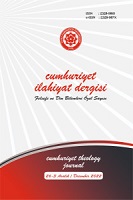Son Zamanlarda Gündeme Gelen İnanç Problemlerine Dair Din Eğitimi Açısından Bir Değerlendirme
An Assessment of the Faith Problems that Have Been Raised Recently in Terms of Religious Education
Author(s): Yunus Emre Sayan, Mehmet Emin GünelSubject(s): Islam studies, School education, State/Government and Education, Sociology of Education, Sociology of Religion
Published by: Cumhuriyet Üniversitesi İlahyat Fakültesi
Keywords: Religious Education; Kalâm; Atheism; Deism; Family; Teacher;
Summary/Abstract: Acceptance or rejection of the existence of Allah is a phenomenon that completely affects a person's view of life. Societies would like their faith to be maintained by the next generation for the continuation of their peace and order. It is difficult for a parent who believes in Allah to communicate and have a healthy dialogue with his/her children who have become atheists. Considering the results of recent field research, it has been stated that the sense of religion has weakened, especially the tendency to doubt the existence of a single and lifeinterfering God has increased due to the spread of secularism, reaching and /or being exposed to different views and thoughts through enriched communication tools. At this point, the deviations of belief in the existence of Allah, such as atheism and deism, which are claimed to be increasing, worry the members of a society that is committed to their religious and cultural values. The problems of belief in Allah are seen either in the form of atheism, which completely denies his existence, or deism, which does not foresee his intervention in life with the acceptance of his existence, or agnosticism, which defends his obscurity due to the confusion experienced in this regard or the nature of the subject. As a member of a religious society, the emergence of many individual and social consequences of a young person's rejection of God, the source of belief, is inevitable. For example, the cultural connection arising from religion will be decoupled between him, his family, and society. Moral behaviors and values that shape the structure of society and are mostly derived from religion may lose their value with the denial of God. A person who falls into this situation might sink into many social and psychological depressions such as loneliness, lack of belonging, and meaninglessness because he breaks his connection with both society and his nature. In particular, the unity of meaning that emerges with the existence of God will leave its place to an indescribable void with its denial. The denial brought about by this emptiness and the thought that there is no life after death, and therefore no reckoning, may make a selfish, individualistic lifestyle reasonable, in which one only thinks about his own desires. In particular, the denial of God by an individual in societies whose lives are largely based on religious values will reveal these consequences more and more severely. Because every value that makes his life meaningful up to a certain time is depreciated. While identifying and responding to the claims of denial ideologies that pave the way for the increase of suspicions towards the Islamic belief principles or the rejection of them is in the field of Kalam, the determination of the problems stemming from the correct method and methodology to be followed during the process and the solution proposals for them are in the field of Religious Education. From this point of view, the problems of denial require consideration of the approaches of two important areas: the determination of the principles of the true faith and the wise method to be followed at the stages of transferring these principles. In Islam, the principles of faith are accepted as religious rules that have not changed in all of the prophets who have lived in different cultures and environments throughout the ages. When we look at the first verses of the Qur'an, it will be seen that the principles of faith are the issues that should be raised first in the process of conveying the message of religion. The fact that these principles are transferred to the addressee by observing certain methods may be considered an indication that the method followed in the transmission of religious principles within the scope of religious education is at least as valuable as the principles. When the principles of faith sent by Allah, who created the ingrain, come together with this disposition, the contentment/tranquility of the heart, which is one of the goals of religion, will be achieved. The transmission of these principles of faith which came from Allah to the interlocutors is carried out as a result of humane behavior, such as the communiqué of the Prophet and/or other invitees. This study aims to identify the problems of belief in the existence of Allah, which are on the agenda in today's Türkiye, and to examine the approach of educators to them within a theoretical framework. The research in the literature was scanned and the current situation was photographed through the documentation method, and solution suggestions to the identified questions and problems were tried to put forward. Although there are many reasons for the belief problems that have emerged recently, the role of family, educators, and learning environments stand out more decisively among them. It is aimed to draw attention, especially to the aspects of the problem arising from the family, educational environments, and the methods and styles of educators within this study. The necessity of complying with the prophetic teaching methods followed by the prophets in conveying the principles of Islamic belief has been discussed in this context in terms of determining the main principles of the prophetic method and ignoring them in matters of faith. It has been tried to develop suggestions for the solution to these problems by making determinations of each problem area.
Journal: Cumhuriyet İlahiyat Dergisi
- Issue Year: 26/2022
- Issue No: 3
- Page Range: 1071-1089
- Page Count: 19
- Language: Turkish

